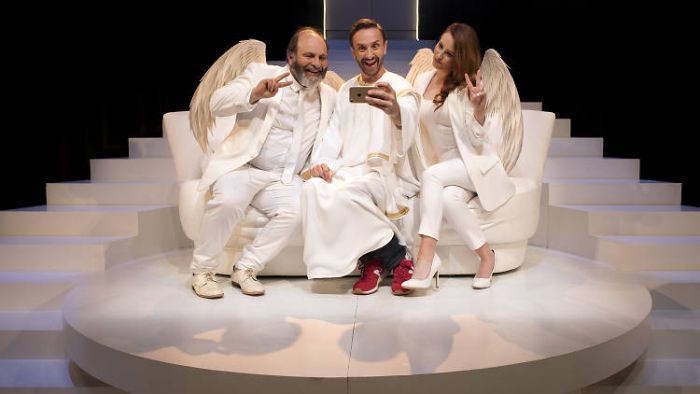It seems appropriate in a time obsessed with transgressive perspectives that God should want to share his story. It is fitting that he chooses an actor through whom he can manifest his histrionic personality, and that he chooses to manifest on a TV presenter’s sofa (complete with puffy cloud cushions) mounted on ascending white steps that end ultimately in a square lit up by a large neon “G”: his “brand” as he tells us.
Attired in a gold-bordered toga-like robe (apparently a burden as he repeatedly adjusts the neckline) over jeans, he flaunts, not red Guccis, but red sneakers and sports fashionable stubble rather than a flowing beard. Flanked by two white business-suited, elaborately winged archangels, Michael (Alan Flower), who proves confrontational, and a glamorous and sycophantic Gabriel (Laura Murphy). God knows how to produce himself. As he always has, he constructs an image of himself that fits his audience’s notion of power, in this case, the trappings of celebrity.
He lets us into his secrets in an off-hand way. Why he really created the universe, the truth about the story of Adam and (St)eve, the reason for his cruel treatment of Abraham and why he chose to inundate the world, how many animals were on the ark and how he tormented Job just for the fun of it. When challenged by Michael to explain suffering, he tells us how much he hates the usual rationalisations, and how he so much prefers the Doctrine of Mysterious Ways. When Michael persists, we are treated to a magnificent display of Old Testament anger in which the presumptuous angel loses a wing, and about which God is later to feel guilt, confessing that he may have “wrath management issues”.
As the whole is structured upon the premise that God having “wearied of the commandments” has rewritten them, and this time, has come in person to deliver them. He maintains the first, naturally, as this enshrines his eminence, and upholds the second on the basis that he simply cannot stand sportsmen thanking him for their achievements when he had nothing whatsoever to do with their success. This objection is in fact the basis of the rewritten last commandment: “Thou shall have faith in thyself.” While hardly a novel idea it is always timely to be reminded, especially in a rousing choral finale by the cast, that we are responsible for the society we have constructed, not systems of belief, whatever they may be.
Readers will have to see the production to discover how God resolves the problem of the Imperfect Universe and of God’s self, for as he says several times, “Really, there must be something wrong with me’. The beautifully staged solution thoroughly delighted the audience, and was a brilliant conclusion to an entertaining evening.
Apart from the amazing Butel, and his supporting angels, congratulations must go to the incredibly inventive creativeA team for a truly spectacular set and immaculate production.





